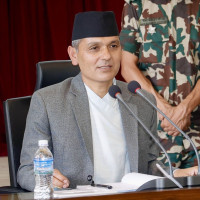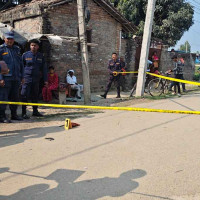- Friday, 20 February 2026
Ways To Make Local Levels Vibrant
Though national politics is mired in controversies and conflicts, local politics looks more or less free of any disquieting features and disturbing tendencies. This author recently took a tour of almost two dozen local governments, including Gaupalika and Nagarpalika, spread across the country to undertake a study of the issues and problems they face in the implementation of local policies. An in-depth discussion with elected representatives and local personnel showed that local governments, both in the hills and Madhes, are mostly focused on improving local service delivery.
A living relationship between rural communities and local governments indeed underpins the functional vibrancies at the local level. Even though issues like lack of proper enabling environment and supportive inputs from the provincial and federal governments are pointed out to be some of the problems confronting the local governments, uneasy relations between elected leaders and personnel pose difficulties in enhancing their functional effectiveness.
New optimism
Almost two-and-a-half years have elapsed since democratic local elections were held in 2079 B.S, which had imparted a fresh vigour into the body politic of local democracy in Nepal. It had given rise to a new optimism and hope for democratic renewal and the rejuvenation of democratic institutions in the country. However, local elections also posed a kind of challenge to the traditional political parties, which do keep guarding zealously the traditional pattern of organisational ethos and leadership. The local elections had signalled that the political parties could lose their relevance and meaning gradually should they fail to attend and respond to the needs and aspirations of the people in an accountable and democratic way.
The surprising victory of the politically non-aligned and independent candidates in the mayoral positions had sent the message that the voters and constituents can rise above the partisan alignment and throw their full weight behind the candidates who have a convincing message for delivery and demonstrate their commitment to integrity and accountability. Another strong indication that can be inferred from the last local elections has been that people no longer vote along the geographical and ethnic divide. And they seem to be more interested in governance and development agenda than in the ethnic and communal issues.
Moreover, the last local polls had confirmed that the local government executives who had failed to perform and deliver to meet the minimum expectations of the people were shown the door. Around sixty to seventy per cent of local government executives who made repeat attempts to return to the posts they held had failed to get elected because of their poor performance and delivery record. Some local government leaders running the municipalities and rural municipalities have been alleged to be lured into corrupt practices and irregularities. The Commission for Investigation of Abuse of Authority (CIAA) report indicates that some municipalities and rural municipalities have been involved in corruption cases. This establishes that governance practices at the local level need to be improved and strengthened.
Following the second local elections held in 2079, it was largely expected that elected representatives would become accountable and governance would improve in a meaningful way compared to the previous period. But the spate of the cases of irregularities and corrupt practices, according to the media reports, did not decline, and poor governance at the local level could not be improved significantly. The elected representatives, in some cases, became so arrogant and errant that there was a persistent tendency to breach laws and rules with impunity.
Some local governments have been reported to be spending money on projects that had not been discussed and endorsed by the local assembly. Not only the equalisation grants but also the conditional grants provided by the Centre had also been misused by many local governments. However, these allegations levelled against the local governments had been brushed aside by the local government authorities time and again.
It must be admitted that there are several public finance management-related challenges and risks, including fiscal indiscipline at the local level. Though financial laws and regulations are enacted to enforce fiscal discipline, they are not fully complied with and followed partly due to a shortage of supportive human resources.
An analysis of the budget data confirms poor prioritisation of projects and programmes leading to spending in non-prioritised areas and sectors. Also, several projects had been listed under priority projects and were considered and approved more on political grounds than on strategic importance. Moreover, poor internal control and weak enforcement of corrective measures against irregularities constitute the challenges to aggravate fiduciary risks at the local level.
Challenges and risks
Given the substantial number of public finance management-related challenges and risks at the local level, both the elected and non-elected officials at the local level need to ensure that such risks are overcome and corrupt practices fully discouraged and fought off. Besides the measures to enforce fiscal discipline, there is a need to build the capacity of local governments both at the organisational and individual level. Such capacity development actions need to be implemented through assessment of the needs, obligations, and expectations. The present coalition government has talked at length about the programmes for capacity development of local governments. But such initiatives should be designed in such a way that they are demand-driven and result-oriented.
Likewise, there is a need for digitisation of the public finance management system, including the information and asset management systems, to reduce the risks of irregularities and wasteful expenditure of resources. In addition, local citizens should also be encouraged and empowered to have a meaningful space to engage with local government through hearings, audits, and consultations to set local governance and development agenda and to seek accountability and responsiveness from the local authorities. These types of civic actions seem to be on the wane.
(The author is presently associated with Policy Research Institute (PRI) as a senior research fellow. rijalmukti@gmail.com)














